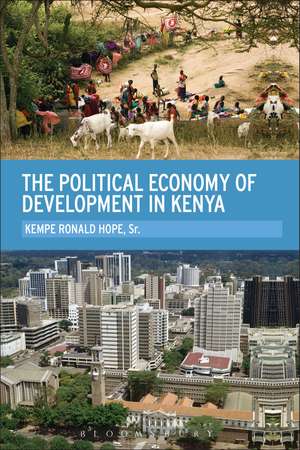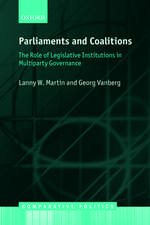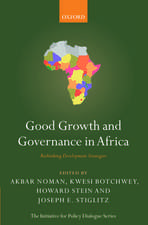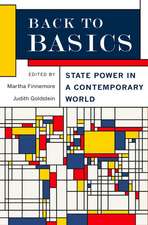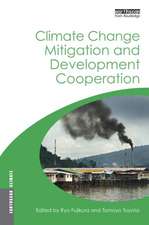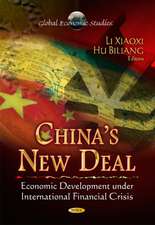The Political Economy of Development in Kenya
Autor Dr. Kempe Ronald Hope, Sr.en Limba Engleză Hardback – feb 2012
This unique survey by a leading expert on the region provides a critical analysis of the socio-economic development in Kenya from a political economy perspective. It highlights Kenya's transition from being a centralized state to having a clear separation of powers and analyzes key issues such as economic growth, urbanization, corruption, and reform.
The book identifies Kenya's key socio-development problems and offers solutions to improve both governance and economic performance, making it an essential resource to researchers, academics, and policy makers working on development issues and African politics.
| Toate formatele și edițiile | Preț | Express |
|---|---|---|
| Paperback (1) | 258.42 lei 6-8 săpt. | |
| Bloomsbury Publishing – 18 dec 2013 | 258.42 lei 6-8 săpt. | |
| Hardback (1) | 891.83 lei 6-8 săpt. | |
| Bloomsbury Publishing – feb 2012 | 891.83 lei 6-8 săpt. |
Preț: 891.83 lei
Preț vechi: 1141.86 lei
-22% Nou
Puncte Express: 1338
Preț estimativ în valută:
170.64€ • 178.19$ • 140.92£
170.64€ • 178.19$ • 140.92£
Carte tipărită la comandă
Livrare economică 15-29 aprilie
Preluare comenzi: 021 569.72.76
Specificații
ISBN-13: 9781441191212
ISBN-10: 1441191216
Pagini: 304
Dimensiuni: 154 x 236 x 24 mm
Greutate: 0.59 kg
Ediția:New.
Editura: Bloomsbury Publishing
Colecția Continuum
Locul publicării:New York, United States
ISBN-10: 1441191216
Pagini: 304
Dimensiuni: 154 x 236 x 24 mm
Greutate: 0.59 kg
Ediția:New.
Editura: Bloomsbury Publishing
Colecția Continuum
Locul publicării:New York, United States
Caracteristici
Offers a comprehensive policy framework for development in the context provided by the 2010 constitution.
Notă biografică
Kempe Ronald Hope, Sr. is Senior Economic Governance Advisor at the United Nations Development Programme in Nairobi, Kenya. He was previously the Principal Economic Adviser and Manager of the Governance and Economic Management Assistance Program at the United States Agency for International Development (USAID), Liberia and Professor of Development Studies at the University of Botswana. He has published extensively on African and international development issues with more than 100 articles and more than 15 books and monographs.
Cuprins
List of Figures and Tables
Abbreviations and Acronyms
Preface
1. Economic Performance and Socio-Economic Trends
Sector Performance
Population, Labor, and Employment
Poverty/Inequality and HIV/AIDS
External Trade
Public Finance
Savings and Investment
Conclusions
2. Urbanization and Urban Growth
Urbanization Trends
Drivers of Urbanization
Consequences of Rapid Urbanization
Managing Rapid Urbanization
Conclusions
3. The Informal Economy
The Nature of Kenya's Informal Economy
Benefits of the Informal Economy
Some Disbenefits of the Informal Economy
Conclusions
4. Corruption and Development
Why Corruption Persists: Causes
Corruption, Development and Governance: Consequences
Tackling the Corruption Epidemic: Control
Towards More Effective Control: Key Lessons and Recommendations
Conclusions
5. Decentralization and Local Governance
Local Government Structure in Kenya
Kenya's Potential Benefits from Devolved Government
Implementing Decentralization/Devolution
Conclusions
6. Public Sector Management and Reform
Public Sector Reform and Transformation
Performance Contracting as a Performance Management Tool
Conclusions
7. Sustaining Growth and Development: Some Aspects of Policy
Savings Mobilization
Private Enterprise-Led Growth and Industrialization
Infrastructure Development
Engaging the Youth: Empowerment, Education, and Employment
State Capability, Good Governance, and the Rule of Law
Conclusions
8. Bringing in the Future: Beyond 2012
The Independent Electoral and Boundaries Commission
The Justice System
Devolution
Parliament
Conclusions
Sector Performance
Population, Labor, and Employment
Poverty/Inequality and HIV/AIDS
External Trade
Public Finance
Savings and Investment
Conclusions
2. Urbanization and Urban Growth
Urbanization Trends
Drivers of Urbanization
Consequences of Rapid Urbanization
Managing Rapid Urbanization
Conclusions
3. The Informal Economy
The Nature of Kenya's Informal Economy
Benefits of the Informal Economy
Some Disbenefits of the Informal Economy
Conclusions
4. Corruption and Development
Why Corruption Persists: Causes
Corruption, Development and Governance: Consequences
Tackling the Corruption Epidemic: Control
Towards More Effective Control: Key Lessons and Recommendations
Conclusions
5. Decentralization and Local Governance
Local Government Structure in Kenya
Kenya's Potential Benefits from Devolved Government
Implementing Decentralization/Devolution
Conclusions
6. Public Sector Management and Reform
Public Sector Reform and Transformation
Performance Contracting as a Performance Management Tool
Conclusions
7. Sustaining Growth and Development: Some Aspects of Policy
Savings Mobilization
Private Enterprise-Led Growth and Industrialization
Infrastructure Development
Engaging the Youth: Empowerment, Education, and Employment
State Capability, Good Governance, and the Rule of Law
Conclusions
8. Bringing in the Future: Beyond 2012
The Independent Electoral and Boundaries Commission
The Justice System
Devolution
Parliament
Conclusions
Recenzii
"The Political Economy of Development in Kenya is written by a seasoned scholar of African studies and is intended to make a significant and timely contribution to the debate on state reconstruction, peaceful coexistence, and sustainable development in Kenya, in particular, and Africa in general. The book contains a very refreshing, rigorous, informative, multidisciplinary and policy-relevant analysis of transition in Kenya and provides practical and effective policy options for policymakers in Kenya and Africa. It breaks new ground in that it emphasizes the importance of effective governance institutions to the fight against corruption and other growth-inhibiting behaviors and provides well-reasoned policy options for promoting economic growth and development. It differs significantly from previous efforts, which have failed to provide a balanced treatment of the informal sector-the volume places the informal sector in its right context and provides policymakers with options on how to strengthen this critical sector and bring it into the core of the country's human development agenda. Although the volume is analytically very strong and extremely rigorous, it is, nevertheless, very accessible to a wide audience. Each chapter contains not only clear and well-documented analyses of various issues that deal with Kenya's transition to democratic governance and sustainable development, but also well-articulated policy recommendations. Hence, the volume is useful, not only for policymakers in Kenya and Africa, but also for the student of African political economy. Students at colleges and universities globally who are seeking a text that provides a balanced and informative analysis of Africa's struggle to achieve peaceful coexistence and sustainable development should find that this volume meets and exceeds their expectations." -John Mukum Mbaku, J.D., Ph.D., Professor of Economics, Department of Economics, Weber State University, Ogden, Utah, USA.
"Hope's timely book provides an original, comprehensive, engaging and thorough analysis of policy framework for sustaining development in Kenya and within the context of the opportunities and environment provided by the 2010 constitution. This succinct and comprehensive treatment of the political economy of development of Kenya should provide an indispensable reading for scholars, development professionals and all those interested in the political economy of development of Africa in general and Kenya in particular." - Bornwell.C.Chikulo, PhD, Professor of Development Studies, North West University, South Africa
This book is about the socio-economic development of Kenya from a political economy perspective. It is divided into eight separate but interlinked chapters that provide a detailed account of the political and socio-economic challenges Kenya faces; which include the country's historical context, the role of urbanization and the informal sector in the economic growth process of the country, poverty and inequality, and corruption among other challenges. The book also critically examines Kenya's political transition and the enactment of the new constitution, which provides a framework for devolution of power from the centre to forty-seven county-level administrations. It also highlights the causes and effects of the post-2007 election disputes that sparked violent conflicts among rival political and ethnic groups and plunged the country into political chaos, which tarnished Kenya's hard-earned reputation as a stable and prosperous democracy, a veritable world class tourist destination. This book not only highlights Kenya's current socio-economic and political problems, but it also provides policy prescriptions to address poor governance, poverty, inequality and sluggish economic growth. The book is of immense value to scholars and policymakers, students and representatives of international organizations that are interested in the political economy of Kenya." -Dr. Asfaw Kumssa, Coordinator, United Nations Centre for Regional Development Africa Office, Kenya
"Hope's timely book provides an original, comprehensive, engaging and thorough analysis of policy framework for sustaining development in Kenya and within the context of the opportunities and environment provided by the 2010 constitution. This succinct and comprehensive treatment of the political economy of development of Kenya should provide an indispensable reading for scholars, development professionals and all those interested in the political economy of development of Africa in general and Kenya in particular." - Bornwell.C.Chikulo, PhD, Professor of Development Studies, North West University, South Africa
This book is about the socio-economic development of Kenya from a political economy perspective. It is divided into eight separate but interlinked chapters that provide a detailed account of the political and socio-economic challenges Kenya faces; which include the country's historical context, the role of urbanization and the informal sector in the economic growth process of the country, poverty and inequality, and corruption among other challenges. The book also critically examines Kenya's political transition and the enactment of the new constitution, which provides a framework for devolution of power from the centre to forty-seven county-level administrations. It also highlights the causes and effects of the post-2007 election disputes that sparked violent conflicts among rival political and ethnic groups and plunged the country into political chaos, which tarnished Kenya's hard-earned reputation as a stable and prosperous democracy, a veritable world class tourist destination. This book not only highlights Kenya's current socio-economic and political problems, but it also provides policy prescriptions to address poor governance, poverty, inequality and sluggish economic growth. The book is of immense value to scholars and policymakers, students and representatives of international organizations that are interested in the political economy of Kenya." -Dr. Asfaw Kumssa, Coordinator, United Nations Centre for Regional Development Africa Office, Kenya
